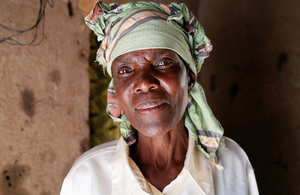Solar boost to release Africa’s untapped energy potential
The Energy Africa campaign will help to accelerate the expansion of the household solar market across the continent.

Elizabeth Mukwimba now has solar lighting and electricity in her home thanks to a scheme backed by UK aid. Picture: Russell Watkins/DFID
The best of British expertise and ingenuity will be applied to take on the low levels of electricity access in Africa as part of a campaign to accelerate the expansion of the household solar market, International Development Minister Grant Shapps announced today.
The Energy Africa campaign will drive a fundamental shift in the household solar market in sub-Saharan Africa, where currently around 2 out of 3 people do not have access to electricity. It will help bring universal energy access in the continent forward from the year 2080 to 2030.
Meet Elizabeth Mukwimba - one of the latest investors in solar technology
Energy Africa will take on the inefficient markets, policy barriers and under-investment which mean that Africans pay as much as 66 times more for their electricity than someone in the UK. It will do this by:
- boosting the market – the heart of the Energy Africa campaign is about removing policy and regulatory barriers to market expansion, and better co-ordinating donor support to the sector as a whole
- agreeing partnerships with key African nations – 14 target countries have been identified for agreements that will set out policy actions, particular to each country, to improve market conditions alongside the co-ordinated support needed to deliver on these, and
- increasing support to the sector – a series of DFID programmes have helped the household solar market get to where it is today, including the Renewable Energy and Adaptation to Climate Technologies (REACT) window of the Africa Enterprise Challenge Fund. Further financial support to the sector will build on this.
The campaign will support and amplify a series of ongoing shifts in the household solar market, including:
- the dramatically decreasing cost of solar photovoltaic panels
- improvements in battery technology – thanks to the development of Lithium batteries
- improvements in the efficiency of appliances (for instance an LED 6 watt produces light equivalent to an Edison bulb on 60 watts) and
- the spread of mobile payment systems enabling access through micro pay-as-you-go.
The campaign will involve key stakeholders including African governments, donors, investors and lenders, industry, NGOs and the public.
Grant Shapps said:
It is shocking that around 2 out of 3 of the African population have no electricity in their homes. This not only holds back individuals, but entire nations. It prevents businesses from trading and holds back economic growth – indeed outages cost African countries 1-2% of their annual GDP.
I have seen for myself how people’s lives can be transformed with the installation of a simple solar panel system. The technology is there – all we have to do is remove the barriers stifling the market. This is what Energy Africa will help do. It has the power to help millions of Africans lift themselves out of poverty and transform the prospects of an entire continent – something that is good for Africa but good for Britain too.
Richard Branson, Founder of Virgin Group, said:
Solar is a tremendous opportunity for African countries to leapfrog traditional carbon intense energy systems to a cost effective, clean energy future.
Brought to scale, it will give countries a stable, reliable energy source and boost job growth. Virgin is planning to invest in a number of projects to help turn this into a reality.
Kofi Annan, Chair of the Africa Progress Panel and Former UN Secretary General, said:
This campaign addresses one of the great injustices of the 21st Century – an injustice that robs millions of our fellow citizens of the dignity, opportunity and freedom that comes with access to modern energy.
Low carbon development has the potential to act as an engine of growth. This is an exciting time to rapidly scale-up Africa’s energy access. This generation of African leaders has a unique opportunity to deliver on the promise of energy for all.
Bob Geldof, campaigner and member of the Africa Progress Panel, said:
The stars are aligned today, we needed the technology to exist before we could electrify a continent, and now this exists.
It is because of the UK government committing to the 0.7% target, uniquely in the G7 and at the behest of the public, that we can now actually achieve this.
This is the moment, this is doable, this is the moment where Africa powers up, switches on and goes for it.
Notes to editors
- The Energy Africa campaign was launched at Facebook’s offices in London on 22 October. Attendees included: Chair of the Africa Progress Panel and Former UN Secretary General Kofi Annan, African Union Commission chairperson Madame Zuma, the Nigerian Vice President Yemi Osinbajo, and the activist Bob Geldof.
- Energy Africa is one component within DFID’s broader approach to energy. This includes a portfolio of approaches to bridge the energy gap – both on and off-grid.
- DFID’s energy access work as a whole is aligned with the new Global Goal 7 on ensuring access to affordable, reliable, sustainable and modern energy for all.
- 621 million Africans live without access to electricity.
Photos, infographics and videos (free to use)
Infographics and high-res photos from the Energy Africa launch event
Photos of clean energy in Tanzania including Elizabeth Mukwimba
Energy Africa animation: http://ow.ly/TIaOT
Source: https://www.youtube.com/watch?v=xIuZIgV8Yv8
Video about Elizabeth Mukwimba - one of the latest investors in solar technology: http://ow.ly/TIaS3 Source: https://www.youtube.com/watch?v=z0iZEijbaLQ
General media queries (24 hours)
Email mediateam@dfid.gov.uk
Telephone 020 7023 0600
If you have an urgent media query, please email the DFID Media Team on mediateam@dfid.gov.uk in the first instance and we will respond as soon as possible.